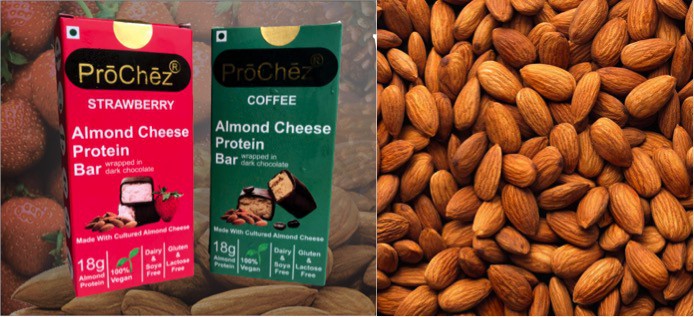With the Prochez brand developed, Axia Foods from India plans to launch cheese and almond butter in 2021.
Currently, cheese and almond butter on the market come in the form of spreads. For Axia, its products reproduce the taste and texture of milk cheese and butter.
Almond Cheese is no stranger to the company that already makes its protein bars from aged, cultured almond cheese wrapped in dark chocolate, which contains around 18g of protein consistent with a 150g serving.
Now available in strawberry and coffee flavors, it expands with a new fruit and matcha variant for January 2021.
Jasmine Shaikh, Founder and CEO, said: “There are protein bars with almond as a small item and almond milk, no cheese and no almond yogurt.
Fermented milks is difficult with almond milk
“It is difficult to make yogurt or cheese with almonds because it has a brackish texture and requires a long period of fermentation. ” Fermentation increases the digestibility of proteins and fats.
The company went into business at the end of August 2019, promoting for the first time plant-based yogurts (Grenyogert brand), smoothies (Grenmylk brand) in December 2019 and most recently protein bars (Prchent brand) in November 2020.
From September 2019 to March 2020, the company recorded around $ 13,000 in sales in the city of Pune alone.
Shaikh was encouraged to start the company after seeing his father’s dialysis situation.
So, she created a cashew yogurt that she enjoyed and to move into a plant-based yogurt, smoothie, and protein bar business.
Axia Foods is also the first in India to create a plant-based probiotic protein yogurt.
Their products are dairy and soy free, and contain protein from sources such as coconut, oatmeal, almonds, and cashews.
For example, their almond yogurt has 23g of protein consistent with a 150g serving, while their cashew yogurt has 23g of protein. Other brands of plant-based yogurt tend to contain between 1 and 10 g of protein.
Probiotic strains
The probiotic strains he uses come with Streptococcus thermophilus, Lactobacillus acidophilus, and Bifidobacterium animalis ssp. lactis.
Shaikh said his yogurt contained between 2 and 2. 5 109 CFU / g of probiotics, its viability depends on the best garage conditions, temperature and humidity in India.
In addition to being a smart source of protein, nuts like almonds are also a source of poly and monounsaturated fatty acids, B and E nutrients, and zinc.
Axia products do not contain preservatives and must be refrigerated. Yogurts and protein bars have a 28-day shelf life between four and 6 degrees Celsius, and shakes 1 four days.
Shaikh added that their products do not include sweeteners, thickening agents like hydrocolloid to provide texture, or starch-based agents to increase protein content, which are found in most products. herbal.
Axia Foods sources its raw fabrics from India, with the exception of its probiotics that come from Spain and France, and manufactures the products in its Pune.
Digital marketing
The yogurts, shakes and protein bars are sold on the Axia website, as well as in supermarkets, organic and wellness product outlets in the Pune region.
Two months ago, the company also partnered with Vvegano, a pan-Indian e-commerce platform that offers vegan food.
Despite sales of around $ 13,000 before COVID-19, sales fell to practically zero from April to July, forcing its production facility to close.
During this time, Shaikh and the team have been working to foster customer adoption in India. A solution to control costs.
“In India, other people are aware of the plant-based diet, but when you call it vegan it becomes a foreign term for consumers, so we really have to replace the way other people see vegan food. “
According to Shaikh, plant-based foods are new to India, where around 60% of the population is vegetarian.
Many brands on the market already offer vegan products, although at a higher cost. For example, cow’s milk prices are between Rs 60-200 ($ 0. 80-2. 70), while plant-based milk prices are around Rs 300-350 ($ 4-4. 70) .
India is about the mass market
Shaikh said: “India is about the mass market, if we want to be successful, everyone deserves power. “
Although there are no almond-based yogurts in India, the cashew-based yogurts on the market charge around 150 rupees (US $ 2) for 100-150g. However, they have a tendency to only involve 1 to 1. 5 g of protein consistent with the serving. Axia cashew yogurt contains 23g of protein equivalent to 150g.
In India, there is also a misconception of protein only for express customer teams such as bodybuilders: “Consumers do not know that protein is an essential macronutrient for health maintenance. “
For Axia Foods, their yogurt (150g) costs around 150-195 rupees (US $ 2-2. 65), smoothies (200ml) at 95 rupees (US $ 1. 30) and Close (150g) at 140 rupees (1Array $ 90).
“People tend to take a look at our value diversity of Rs 190, they think it is too expensive and they are not going to try. If we can reduce portion sizes and value, we can attract more consumers. “
The company plans to expand to the United Arab Emirates and the United Kingdom in 2021, after attracting interest from regions that join Germany and the United States.
“In the United Arab Emirates, nut foods are not unusual in your daily diet, and our products are simply nuts in some other format, which suits your taste buds. “
“People also see the importance of smart nutrition to stay healthy, than spending money on drugs. “
Source : Newsus app Jan 4 2021

